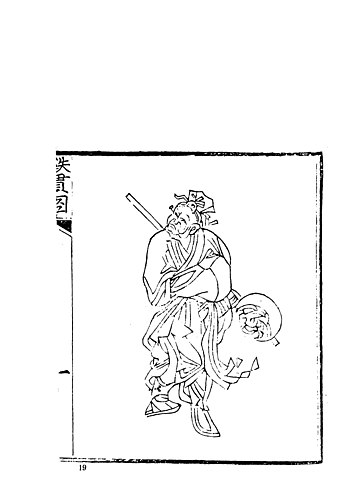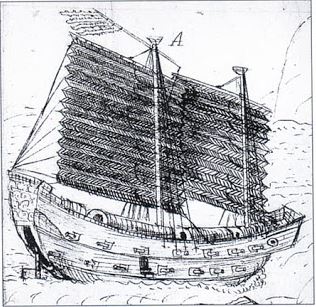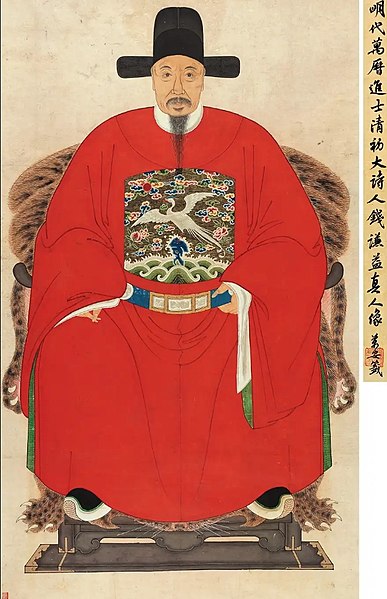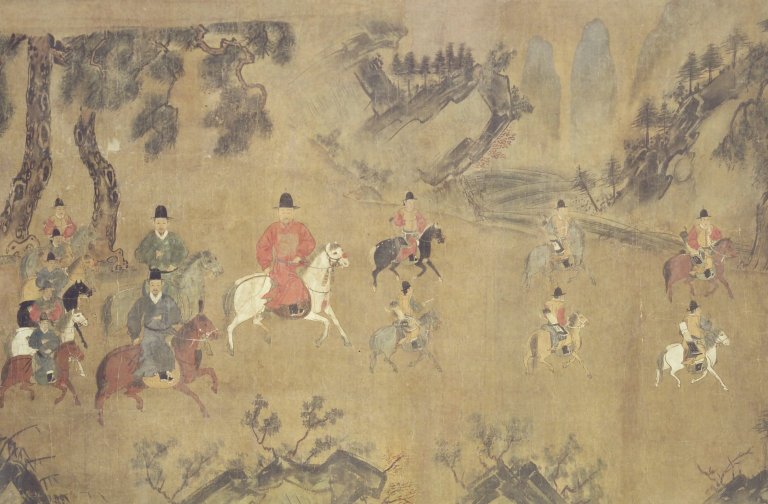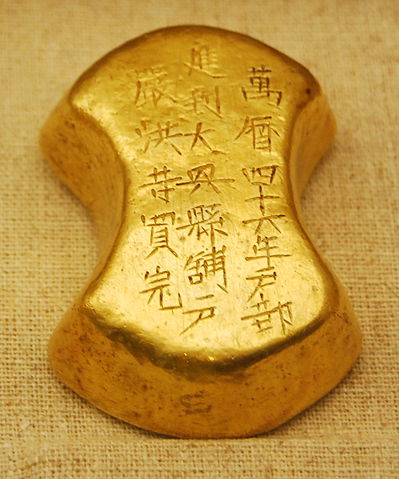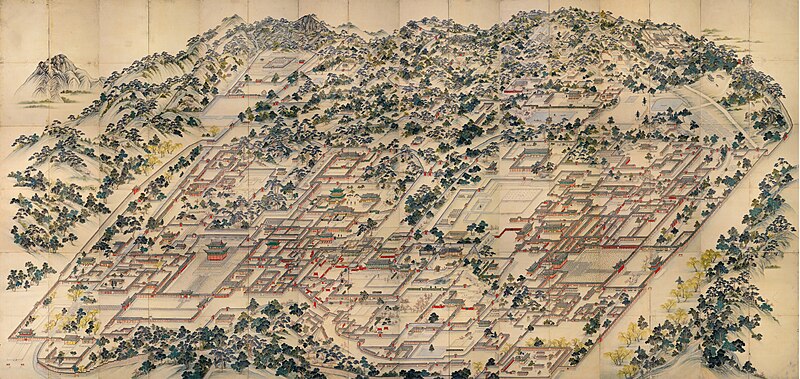
Talisman to ward off plague, excerpted from literature of Gao Lian (reprinted circa 1635)
Two major events took place in 1635 that still didn’t manage to be the single most dramatic moment of the year. (From the perspective of the court in Beijing, of course. Plenty of dramatic events are happening elsewhere -- a hurricane wrecked some of England's New World colonies, and Shah Jahan down in India has unveiled a truly remarkable throne, following which he ordered the demolition of the Jesuits' headquarters -- but that's another story.)
In central China, Hong Chengchou and Daišan finally move against the Yellow Tiger. They had been sweeping through the countryside putting out fires, but now, at last, they are able to face China’s most notorious bandit leader.
The outlaw army is not caught unawares, seeing as a large Ming force is unlikely to be particularly sneaky. Of course, neither are they; the two armies are doing a very good job of demonstrating how warfare is only really practical in areas with sufficient food supplies. The two armies are also doing a good job of demonstrating how large bodies of men will rapidly deplete even the most fertile farmlands of surplus food.
Hong Chengchou makes at least some attempt to pay for anything that his soldiers “forage,” although undoubtedly this was little more than a token effort. It is entirely possible that later chronicles played up his actions in order to make him look better. Realistically, there is no way that he would have been able to adequately recompense everyone. Still, it’s acknowledged that he tried his best. The fact is that while the Yellow Tiger has made a policy of recruiting disaffected peasants to join his cause (just like every other upjumped warlord), the truth remains that hungry peasants tend to get angry at whomever is currently stealing their food. All armies need food, and the Yellow Tiger’s army is no exception.
This is probably why battle commences early in the year. While the skirmish is usually known as the Battle of Mianshan, it actually occurred a fair distance from the sacred mountain, to the point where some modern historians think that the mountain itself was barely visible (if at all) to the combatants. The results are mostly inconclusive. Hong Chengchou and Daišan jointly claim victory, but the Yellow Tiger slips away in the aftermath. The Yellow Tiger’s supporters claim victory, but they have to abandon the region. Never again will the Yellow Tiger range so far north.
Incidentally, Hong Chengchou and Daišan are getting along just fine. Hong Chengchou is well aware that Ming armies, typically lacking in cavalry, have long recruited from northern steppe peoples, and sees this as an unexceptional continuation of that trend. The fact that Daišan and the Plain Red Banner came to reinforce him just in time is also a good thing. Daišan, for his part, appreciates that Hong Chengchou isn’t a complete dickhead. There will be glory for the victories they will win together, he thinks to himself.
(Those who have read “The Yellow Tiger’s Fury” or viewed any of its modern dramatic adaptations may suspect a deeper relationship between the two. Historians are greatly divided on the subject.)
Up north, Yuan Chonghuan leads a substantial field army against Ligdan Khan (or possibly Ejei Khan, his son; sources aren’t exactly clear on which one was in de facto control at this point, although Ligdan Khan did fall ill several times before his eventual confirmed death in the next year). This battle, again, is inconclusive. The Chakhar mostly fall back in the face of Ming advances and the Ming are not able to pursue them with sufficient speed. Yuan Chonghuan does reassert Ming sovereignty over the contested areas, routing the small units of (usually junior) horsemen who had miscalculated their retreat.
Ajige of the Jurchens does not respond, being very busy fighting off yet another coup attempt. Besides, he had no real sentiment for Ligdan Khan. So Yuan Chonghuan’s expedition is mostly unopposed, and is counted as a success in Beijing for its show of force.
Yuan Chonghuan himself argues for another expedition the following year. He believes that, though the Mongols have been cowed, they need to be well and truly smashed, remembering his great victories against the Jurchens years earlier. Also, so long as everyone gets back in time for the harvest, it might actually be a good idea to take a bunch of peasant levies out where they can’t cause trouble. Win-win.
Knowing the general’s stature, most people at court nod approvingly at the suggestion.
In any other year, the twin victories (or close enough) against the Yellow Tiger and Ligdan Khan would’ve been the most important events in the chronicles. In most worlds, they undoubtedly would have been, for 1635 was by most counts an uneventful year -- for a while.
Later in the year, the emperor’s uncle Zhu Changxun, Prince of Fu (favorite son of the Tianqi Emperor’s grandfather, who would have been heir to the imperial throne if it were not for the rigid traditions of the court) falls ill. He had recently traveled to a part of China where tremendous numbers of peasants had grown sick and died, on business or for some unknown purpose. What is known is that the Prince of Fu was very sick, his body covered with bloody pustules and, reportedly, blood visible in his vomit. He lingers for five days before dying.[1]
It is the first time that this generation of Ming nobility has to grapple with the fact that the plague has arrived. Of course, the plague itself has not yet spread to Beijing; the Prince of Fu, from his estate in rural Henan province, was simply unfortunate enough to be in the wrong place at the wrong time. His death alarmed the court, focused minds on an issue that had until then been a distant thing, a problem for the peasantry.
The plague was one disease for which there was no sure remedy. The Prince of Fu had many decent physicians in attendance, who, we are told, tried many cures listed in the Bencao Gangmu to no avail. The best cure was prevention; failing that, luck.
Zhu Yousong, the Prince of Dechang, succeeds his father as Prince of Fu. The emperor’s cousin travels from Beijing back to the family estate to properly mourn his father. According to some accounts, he refuses to even enter the household for nearly a week, until the servants are able to convince him that the place has been thoroughly cleansed and that nobody else was infected.
The resulting delay to the funerary procedures was a trifle unfilial, and some in Beijing clucked their tongues at the prince’s actions. Nobody was so gauche as to actually laugh, but it was a silly little distraction from the ordinary day-to-day.
A pity that it could not have happened a year later.
Footnote
[1] As noted in the 1628 update, his death IOTL was not pleasant. That fate has been butterflied away and another one takes its place. Sorry, man.
